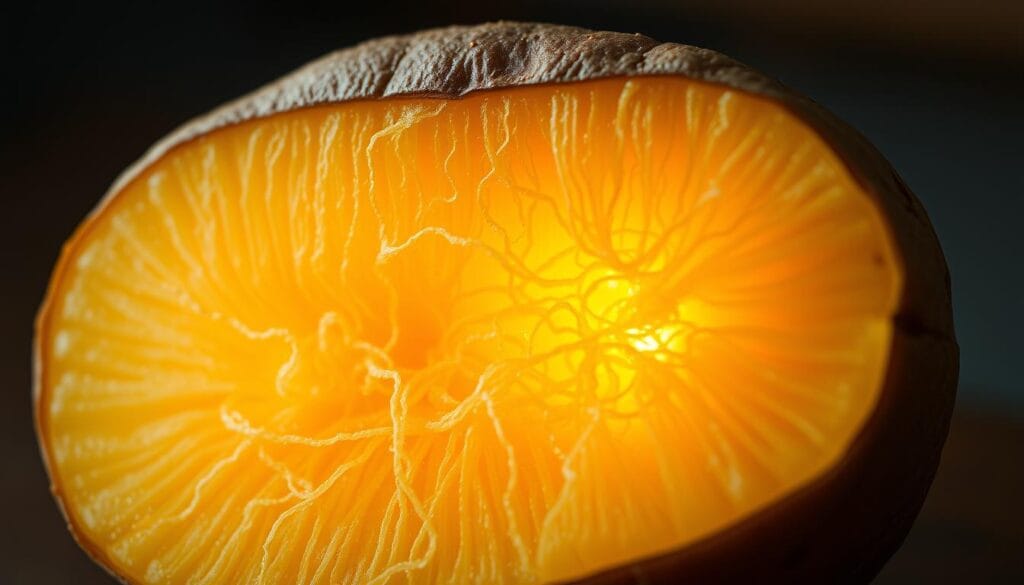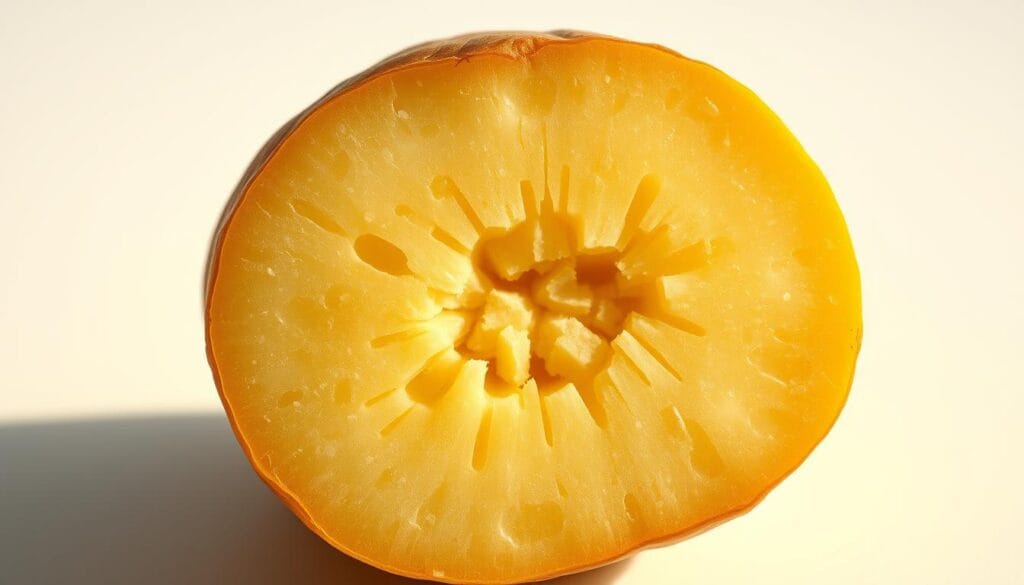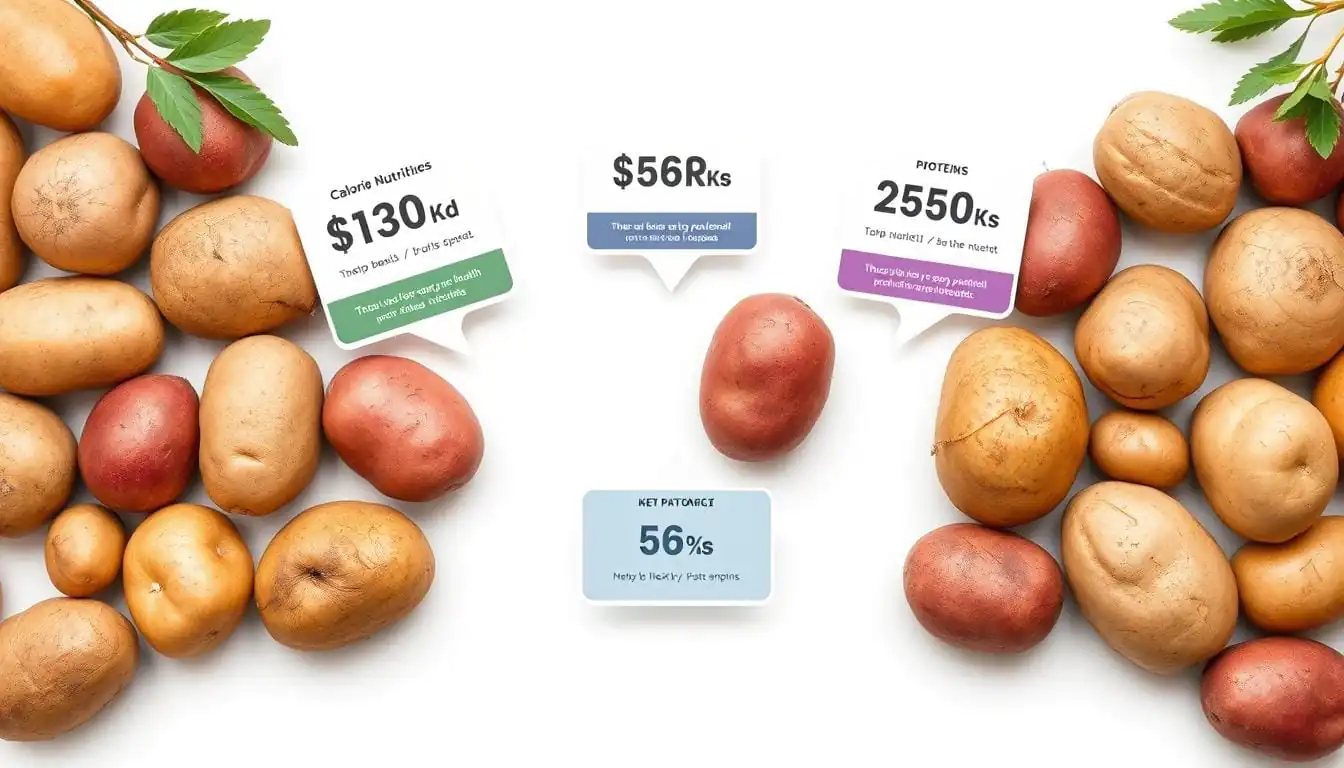Potato Nutritional Facts: Calories, Protein, and Health Benefits
When you think about potatoes, you might wonder what they offer nutritionally. Knowing about potato nutritional facts helps you see how they fit into a healthy diet.
A medium russet potato has 164 calories, 37 grams of carbs, and 4 grams of fiber. This shows potatoes are good for you, supporting digestion and providing important vitamins and minerals.
Table of Contents
Key Takeaways
- Potatoes are a good source of fiber, containing both soluble and insoluble fiber that supports gut health.
- A medium russet potato provides 4 grams of protein and 0.2 grams of fat, making it a relatively low-calorie food.
- Potatoes are rich in essential vitamins and minerals, including potassium, vitamin C, and vitamin B6.
- The calories in potatoes can vary depending on the type and cooking method, with boiled potatoes being a lower-calorie option.
- Incorporating potatoes into your diet can have numerous health benefits, from supporting healthy blood sugar levels to reducing the risk of certain diseases.
- Understanding potato nutritional facts can help you make informed decisions about your diet and ensure you’re getting the most nutritional value from your potatoes.
Exploring the nutritional content of potatoes helps you understand their benefits. They can support weight management, healthy digestion, and add nutrients to your diet. Potatoes are a versatile and nutritious food that can be a great addition to your meals.
Understanding the Basic Potato Nutritional Facts
Exploring potatoes means knowing their nutritional basics. They are packed with carbohydrate content in potatoes. A medium-sized baked russet potato has 37g of carbs. Plus, they offer potato vitamins and minerals like potassium, vitamin C, and fiber.
A medium-sized baked russet potato has 164 calories. Most of these calories, 88%, come from carbs. The carbs in potatoes are mainly starch, fiber, and sugars. They also have 4.6g of protein.
Potatoes are full of vitamin C. A medium-sized baked russet potato gives about 19% of the daily value. They’re also rich in potassium, key for muscle and nerve health.
The nutritional value of potatoes can change based on type and cooking. Baked potatoes have a higher glycemic index than boiled ones. Knowing these basics helps you choose how to add potatoes to your meals.
Caloric Content of Potatoes
Understanding the calories in potatoes is key to knowing their nutritional value. A medium potato, about 150 grams, has 110-120 calories. The calories can change based on the potato type and how it’s cooked. For example, 100g of King Edward Potatoes has 91 calories, while 100g of Jersey Royal New Potatoes has 71 calories.
Potatoes are also a good source of protein. A medium potato has about 4-5 grams of protein. This makes them a great choice for a plant-based diet. They also have complex carbs, fiber, and minerals like potassium. These help with blood pressure and overall health.
Here are some key points to consider when evaluating the caloric content of potatoes:
- A medium baked russet potato (173g) provides 164 calories
- A portion (175g) of boiled potatoes contains 119 kcal
- Potatoes are considered a “nutrient-dense” food, providing a high concentration of essential nutrients relative to their calorie content
Knowing the calories and protein in potatoes helps you make better diet choices. They can help with weight management or ensure you get the nutrients you need. Potatoes are a valuable part of a balanced diet.
Carbohydrates in Potatoes: Breaking Down the Numbers
Potatoes are packed with complex carbs like starch and fiber. They also have simple sugars. The glycemic index of potatoes changes based on type and cooking method. Boiled potatoes have a lower glycemic index than roasted or mashed ones.
A large sweet potato has 37g of carbs, mixing complex and simple carbs. Sweet potatoes’ glycemic index ranges from 41 to 93, depending on how they’re cooked. Knowing the glycemic index helps manage blood sugar and control carb intake.
The daily carb intake should be 45-65% of your calories. For a 2,000 calorie diet, that’s 275g of carbs daily. Potatoes can be a good carb source, but balance them with other foods for a healthy diet.
Protein Content and Amino Acid Profile
Potatoes have a small but important amount of protein. They offer about 1.9 grams of protein per 2/3 cup (100 grams) when boiled. This makes them a good choice for a balanced diet. Plus, potatoes have all essential amino acids, making them a high-quality protein source.
The protein in potatoes can change based on the type. Russet potatoes have about 2.0 grams of protein per 100 grams. Sweet potatoes have about 1.6 grams. While they don’t have as much protein as foods like eggs or chicken, they can still help meet your daily protein needs. This is especially true when you eat them with other protein-rich foods.

A medium Russet potato has about 2.5 grams of protein. A medium sweet potato has about 1.6 grams. Adding Greek yogurt or black beans to your meals can quickly increase the protein. The amino acid profile of potatoes is also key, providing all essential amino acids for a balanced diet.
There are many high-protein potato dishes to try. For example, loaded baked potatoes with Greek yogurt and cheese, or a sweet potato and black bean salad. Even a potato and egg scramble can be high in protein. These dishes are great for boosting your protein intake. Overall, potatoes are a nutritious and valuable part of a balanced diet.
Essential Vitamins Found in Potatoes
Potatoes are rich in essential vitamins and minerals, rendering them a nutritious option. They offer a range of nutrients, including vitamin C. A medium potato gives you almost a third of the vitamin C you need daily.
Potatoes have vitamins like C, B vitamins, and more. These vitamins are key for staying healthy. Vitamin C boosts your immune system, while B vitamins help with energy.
Vitamin C Content
A medium potato weighing 5.3 ounces, including the skin, contains 27 mg of vitamin C. This is almost a third of what you need every day. Potatoes are a top source of vitamin C, vital for your immune system.
B Vitamins in Potatoes
Potatoes also have B vitamins, like vitamin B6. A medium potato has 0.2 mg of B6, which is 10% of your daily value. B vitamins help you stay energized and focused.
Potatoes have more than just vitamin C and B vitamins. They also have potassium, magnesium, and iron. This makes them a food full of nutrients. Adding potatoes to your diet boosts your intake of important vitamins and minerals, like vitamin C.
Mineral Content and Their Benefits
Potatoes are packed with minerals like potassium, magnesium, and iron. These minerals are key for keeping blood pressure healthy, bones strong, and the immune system working well. Adding potatoes to your meals can boost your health.
Potatoes are especially good for your blood pressure thanks to their potassium. A 3.5-ounce serving of cooked red potatoes has 545 milligrams of potassium. That’s 12% of what you need daily. Baked sweet potatoes with skin also offer 473 milligrams of potassium, which is 10% of your daily needs.
- Potassium: essential for healthy blood pressure and fluid balance
- Magnesium: important for bone health and energy production
- Iron: crucial for healthy red blood cells
Potatoes are not just full of minerals. They also have fiber, vitamins, and antioxidants. These nutrients make potatoes a great choice for a balanced diet.
Fiber Content and Digestive Health
Fiber is key for digestive health. Potatoes are a good source of it, with both soluble and insoluble types. A medium-sized potato with skin has about 4 grams of fiber, which is 15% of what we need daily. This fiber helps with regular bowel movements, prevents constipation, and supports good gut bacteria.
Eating potatoes with skin boosts their fiber content. A cooked potato with skin has about 2 grams of fiber. Without skin, it has about 1 gram. Potatoes can help us reach the daily fiber goal of 25-38 grams.
Types of Fiber in Potatoes
Potatoes have both soluble and insoluble fiber. Soluble fiber turns into a gel-like substance, helping lower cholesterol and control blood sugar. Insoluble fiber adds bulk to stool, making bowel movements regular.
Daily Fiber Requirements and How Potatoes Help
We need 25-38 grams of fiber daily. Potatoes, especially with skin, can help meet this need. Here’s how:
- One medium-sized potato with skin provides about 4 grams of dietary fiber
- A cooked potato with skin contains about 2 grams of dietary fiber
- Potatoes are a good source of soluble and insoluble fiber, which can help promote digestive health
Potatoes: A Key Mineral for Heart Health
Potatoes are packed with potassium, a mineral crucial for heart health. A 100g serving of raw potatoes has about 421 mg of potassium. This is about 9% of what we need daily. So, potatoes are a key part of a healthy diet, thanks to their potassium.
Compared to other foods, potatoes stand out as a great source of potassium. For instance, a medium potato with skin has around 620 mg of potassium. This is more than what you find in bananas. This shows how important potatoes are for keeping your heart healthy.

The benefits of potassium in potatoes for heart health are many. Potassium helps lower blood pressure, which reduces heart disease risk. It also keeps blood vessels healthy, boosting overall heart health. Adding potatoes to your meals can help you enjoy their potassium benefits and support your heart health.
How Different Cooking Methods Affect Nutrition
Cooking methods can greatly change the nutritional value of potatoes. It’s key to pick a method that keeps vitamins and minerals intact. For example, steaming and microwaving are better at keeping nutrients than boiling or frying.
Methods like boiling, stewing, braising, and steaming can cause nutrient loss. This loss is especially true for antioxidants and water-soluble vitamins. But, the amount lost depends on the method and the potato type. Knowing how different methods affect potato nutrition is crucial.
Here are some important points about cooking methods and potato nutrition:
* Steaming and microwaving are better at keeping nutrients.
* Boiling and frying can cause a lot of nutrient loss.
* The potato type and cooking method affect vitamin and mineral retention.
Choosing the right cooking method helps keep potatoes nutritious. Consequently, they represent a beneficial addition to your diet. Understanding the impact of cooking methods on potato nutrition helps you make better food choices.
Incorporating Potatoes into a Healthy Diet
Exploring ways to improve your diet? Think about adding potatoes. They’re packed with potassium, fiber, and vitamins. Plus, they’re easy to cook in many ways, making them a great fit for any meal.
To maximize nutrition from potatoes, use best practices. Bake or roast them instead of frying. Choose low-fat toppings. A medium potato has about 164 calories, 4g of protein, and 4g of fiber.
Try healthy potato-based recipes like roasted potatoes with herbs or baked potatoes with veggies and lean proteins. Sweet potatoes are also a good choice, rich in vitamin A and fiber.
- Start with a medium-sized potato as a serving size
- Choose low-fat toppings and cooking methods
- Experiment with different types of potatoes and recipes
By following these tips, potatoes can be a nutritious part of your healthy diet. They help keep your diet balanced and interesting.
Conclusion: Making the Most of Potato Nutrition
Potatoes are a nutritious and versatile food. They can be a great addition to a balanced diet. They are full of calories, carbs, and protein, and also vitamins, minerals, and fiber.
It’s important to know the differences in potato nutrition. This includes raw vs. cooked potatoes and how cooking methods affect them. By understanding these, you can enjoy potatoes in healthy and tasty ways.
Studies show that eating boiled potatoes regularly may lower the risk of death. This is good news for those who make potatoes a part of their diet. Just remember to avoid high-fat, high-sodium ways of preparing them.
So, let’s make the most of potato nutrition. Enjoy them in many ways, like baking, roasting, or in your favorite recipes. Potatoes can be a delicious and nutritious part of a healthy lifestyle.

